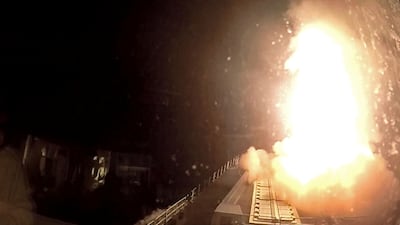Live updates: Follow the latest news on Israel-Gaza
Bab Al Mandeb, at the southern end of the Red Sea, has always been a theoretical maritime chokepoint – shown on maps but never seriously threatened, unlike the Suez Canal or Strait of Hormuz.
Now, that has changed.
Four of the world’s top five shipping companies have suspended movements through the “Gate of Tears”, as the strait is known, after Houthi forces in Yemen recently hit vessels with drone and ballistic missile strikes.
The US has stepped up its maritime presence, with American and British warships shooting down some drones. But, as I wrote in October, the proliferation of cheap and increasingly sophisticated drones poses a growing threat to energy infrastructure and transit.
The hit on the MV Palatium III, a Liberian-flagged container ship, was the first by an anti-ship ballistic missile. On Wednesday, the Marshall Islands-flagged tanker Ardmore Encounter, carrying jet fuel, also had missiles fired at it but it was not hit.
Ukraine has also pioneered the use of marine drones in its defence against Russia; something similar might make an appearance in the Red Sea.
The Houthis claim their targets are Israel-linked ships, but most of the vessels attacked have no such connections. It is not clear how directly Iran is involved in the strikes, but it does provide weapons, expertise and intelligence to the Yemeni group.
Bab Al Mandeb is only 32km wide, divided into westerly 26km and easterly 3km channels by the volcanic island of Perim, known as Mayyun in Arabic. It is even narrower than the Hormuz Strait.
About 12 per cent of the seaborne oil trade and 8 per cent of liquefied natural gas passes through Bab Al Mandeb.
Increased imports from the GCC have become increasingly critical for Europe after the near-total cessation of Russian gas and oil supplies. It is also problematic for Saudi Arabia, which has oil, petrochemical and industrial ports at Jizan, Jeddah and Yanbu on its Red Sea coast.
The Red Sea is not closed to shipping, of course, but insurance rates have risen and more ship operators may choose to avoid the area.
This is bad news for cash-strapped Egypt, which made more than $9 billion from the Suez Canal in the last fiscal year, more than 11 per cent of government revenue.
As for China, the Red Sea is not used for Gulf oil and LNG shipments eastward, but for the transport of Russian oil. China and India are now Moscow’s main customers.
Bab Al Mandeb is also crucial for exports of Chinese manufactured goods to Europe. All such transport could reroute around the Cape of Good Hope, but at the expense of higher costs and much longer voyages.
This proportionately affects India even more. A tanker from Russia’s main Black Sea oil port of Novorossiysk to Mumbai takes about 18 days via the Suez Canal and Bab Al Mandeb, but 50 days round the Cape of Good Hope.
Europe has successfully overcome last year’s energy shock. Prices have fallen back from record highs to moderate levels. But this has left the global energy system dangerously stretched.
There is no spare gas production capacity, with the Northern Hemisphere winter now well under way. There is significant spare oil capacity, but almost all of it is concentrated around the Gulf – in the UAE, Saudi Arabia, Kuwait, Iraq and Iran.
The European approach to energy security is to scramble for short-term supplies and subsidise consumers in times of emergency while assuming renewables will solve everything by 2030. There is not much planning for the medium term. In maritime security, the EU has mostly passively ridden on the US.
Meanwhile, the administration of US President Joe Biden is content to manage some conflicts it should seek to win – namely Ukraine – and to wring its hands over others it could help to bring to compromise peace, namely Gaza and Yemen. It missed a chance for successful diplomacy with Iran immediately after entering office but has not confronted Tehran very robustly either.
The chance of an Israeli extension of the conflict to Hezbollah in Lebanon has grown. Washington’s kowtowing to the interests of Israeli Prime Minister Benjamin Netanyahu’s government does not just endanger the lives of Palestinians and Israelis, but the security of the wider region, and global energy.
China’s position is interesting. It helped mediate the normalisation of relations between Iran and Saudi Arabia in March. A clear aim of Beijing’s was to ensure that if confrontation escalated in the Gulf, its energy supplies would not be threatened.
It has a naval base in Djibouti, just outside the strait, but does not so far appear to have intervened to protect any vessel, even the Hong Kong-flagged Maersk Gibraltar that was attacked on Wednesday. The US would be hesitant to invite any deeper co-operation with its Asian rival.
A greater western naval presence in the Red Sea is expected to be very expensive, risks overstretching the fleets of the US and its allies, and would still have difficulty protecting every civilian ship. This is not similar to the “Tanker War” phase of the Iran-Iraq War, from 1984-1988, when the threats came from aircraft and small boats.
Otherwise, the US may choose to strike directly at onshore Houthi targets. But that risks reigniting a war that entered a ceasefire in April last year, inviting Iranian escalation and dragging Washington into yet another Middle East quagmire, while it has larger, longer-term threats in eastern Europe and East Asia to worry about.
There are no good options in this situation. Deterrence and defence may ultimately ensure free passage through the Red Sea again.
But resolving, not dragging out, some regional and far-off conflicts would help.
At some point, good luck with gambling on global energy security is going to run out – bringing tears for all.
Robin M Mills is chief executive of Qamar Energy and author of The Myth of the Oil Crisis


